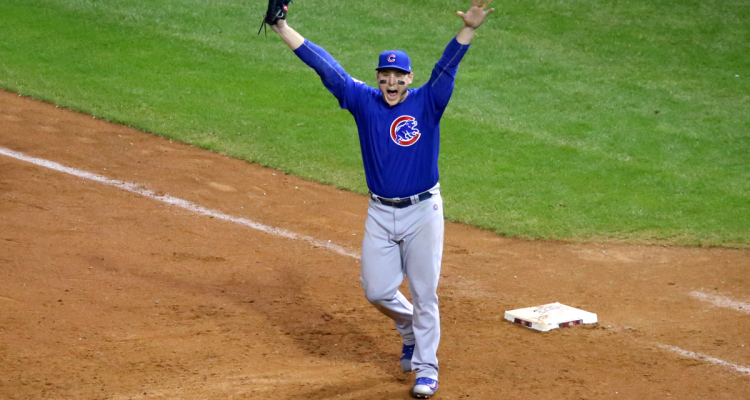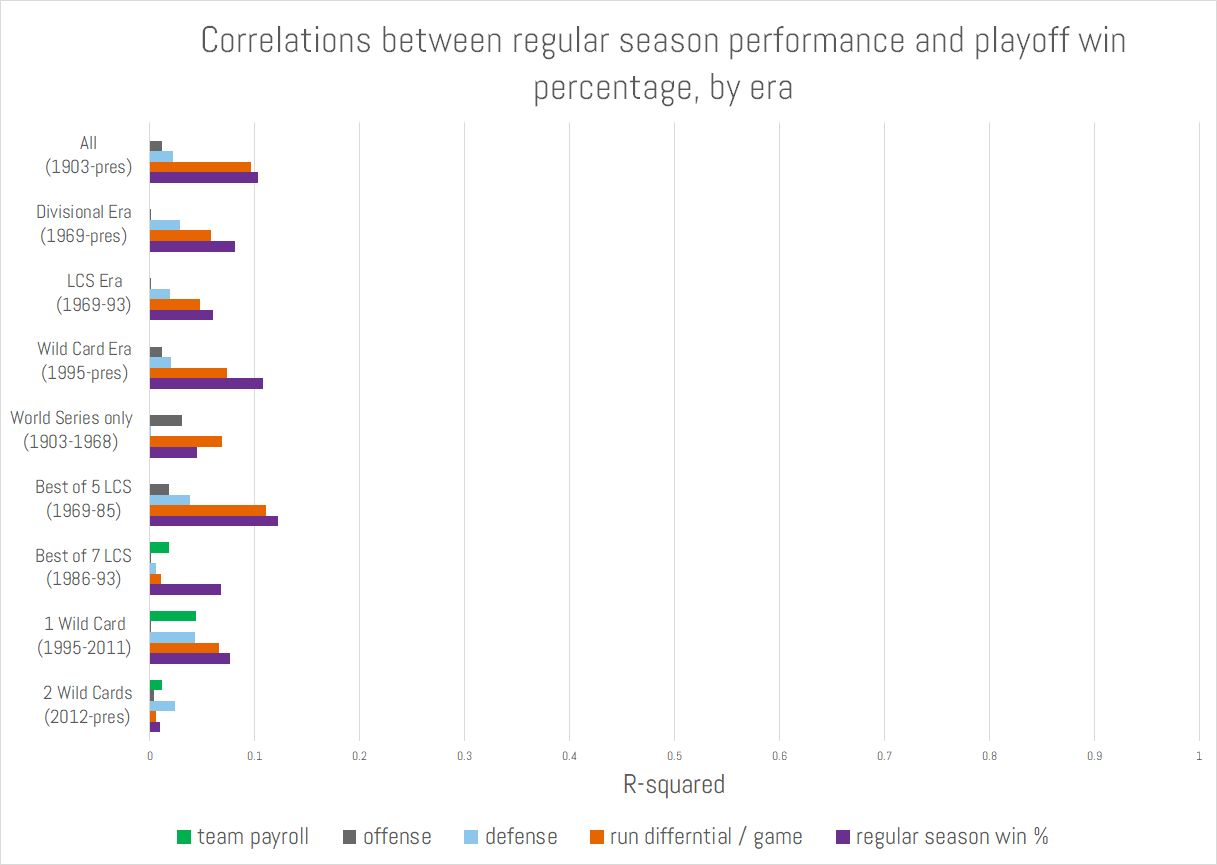By: Patrick W. Zimmerman
The 2017 MLB season is finally winding towards its annual Myth & Legends Factory, the playoffs, I’ve started to wonder. How much of the trick to winning is really just playing well enough during the regular season to qualify?
Yeah, you might end up like the 1991-2005 Atlanta Braves (14 straight playoff appearances. 1 title), but you might get some 2010-16 San Francisco Giants even-year voodoo, too (4 appearances in 6 years, 3 trophies). Can we at least say that Braves process was right? Or is there some truth to the “best teams show it in October” narrative?
MLB (and every broadcaster ever) desperately wants the paying customer to believe in causation, of course. Without narrative, without deserving victories, there is no drama. And without drama, there are no ratings.
The question
Is the MLB postseason really just random noise? Are October heroes simply the winners of a cosmic coin flip? Do the Baseball Gods play dice?
The short-short version
Oh hell yes. Even more than I thought. It’s randomer than a bunch of a nerds rolling 3d20.
The correlation between playoff winning percentage and regular season performance is so low to be laughable. Leaving aside the issue of curse-breaking divine intervention, last year’s playoffs were somewhat unusual in that the best team (the Chicago Cubs, by both winning %, run differential, and most other measures) actually won the World Series. And it took 7 games and extra innings, even then.
Basically, the difference in regular season performance among the (usually) good teams that make the playoffs is meaningless in the short-series environment of the MLB playoff tournament. Sure, if the 107-loss 2012 Houston Astros (the team that gifted posterity with the most hilariously bad play of all time) were thrown into a playoff tournament, you’d be able to see a difference. But of the subset of 420 teams who have ever made the playoffs? Not so much.
There is no single magic metric to unlock the mysteries of the universe. There is no Key Performance Indicator, no one weird trick to winning it all. R2 is a useful tool, but not necessary and sufficient to understanding causality.
But when ALL the numbers say the same thing? Yeah. That’s meaningful.
The methodology
I tested postseason winning percentage against:
- Regular season performance (all pulled from Retrosheet.org):
- Winning percentage
- Run differential / game (per-game to normalize for different lengths of season).
- Offense (runs scored / game)
- Defense (runs allowed / game)
- Post-trade deadline performance (date-by-date standings available on Baseball Reference):
- Winning percentage
- Run differential / game (per-game to normalize for different lengths of season).
- Offense (runs scored / game)
- Defense (runs allowed / game)
- $$$
- Salary information is available since 1988 via the Baseball Cube.
I then segmented the dataset by playoff format to define postseason eras (i.e., the 5-game LCS ERA).
The highest correlation to playoff success was a whopping R2=0.122 (5 game LCS era, winning percentage regular season).
Nnnnnnnnnnooooooooooooppppppeeee. Nothin’.
Run differential (and, thus, Pythagorean record)
Hover for details. Search for team or year.
Nope. Even though run differential is a better predictor of true talent than just wins and losses, there’s no correlation between regular-season run differential and playoff success. Overall, R2 is just 0.097. Translated: Diddly/squat.
Unless you’re the Baltimore Orioles (R2 = 0.271), Cincinnati Reds (R2 = 0.270), or New York Yankees (R2 = 0.191). Then there’s a mild relationship.
Money doesn’t buy trophies (but it probably does buy a chance at them)
Myth, BUSTED. Sorry, money apparently can’t buy happinness or glorious victory (which are pretty much the same thing). Indeed, MLB’s big, bad rich kids, the Yankees, actually have a slight negative correlation to how much they spend relative to league average.
This makes some intuitive sense, particularly for dynasties like the Yankees: younger teams that tend to win repeatedly start out cheaper, and old teams near the end of a run of greatness tend to get really expensive.
However, teams with a higher payroll do tend to be the ones that make the playoffs in the first place, with the average playoff team spending 0.55 standard deviations above the league average payroll for that year. So while cold hard cash doesn’t guarantee glory, it does help buy a chance at it. More lottery tickets generally equals more championships.
Note: salary data only really reliable back to 1988, so {{insert small sample-size caveat here}}.
Regular Season winning percentage
Still nope. R2 is just 0.104. Pat your team on the back for winning 100 games. Well done!
But don’t rush to Vegas to put down money.
Does defense win championships?
Is run suppression the key, then? Well, not really. It worked out great for the 1907 Cubs and the 1981 Dodgers, but the 1993 Blue Jays, 1987 Twins, or 1996 Yankees didn’t exactly dazzle, allowing more than 4.5 runs per game. You can win with good defense, you can lose with great defense (see 1906 Cubs), and R2 is accordingly a minuscule 0.022.
Does offense wins championships?
How about bombing the ball like the 1927 Yankees?
Well, sure, that worked well for them (and most of the Yankees teams of the 1920s and 1930s). It makes sense to go that route when you’ve got Ruth, DiMaggio, and Gehrig. But the 2014 Giants (and their World Series opponents, the Royals), barely put up 4 runs per game and still won. Offense is not the only way to win playoff games. R2 = 0.011.
Finishing strong
What about just looking at performance after the trade deadline (late June from 1923 until 1985, July 31st since then)? Does a team that finishes strong “peak at the right time?”
Not that I can see. Check out all the same measures, just truncated for after the trade deadline:
No patterns here. Not even if you really squint hard.
Winning percentage during the last couple months of a season isn’t it, either. Sorry to burst the bubble.
Nor is defense down the stretch. There are bunches of teams who pitched great in August and September, and others who took their team ERA and lit it on fire.
Offense is no help, necessarily. I mean, offense is always helpful if a team likes to win baseball games, but it’s not a determining factor in how a team will play in the playoffs.
Conclusions
Congratulations, 1987 Minnesota Twins! You were (by far) the worst World Champions of all time, managing to win after a season with a negative 20 run differential. Only 6 teams even managed to make the playoffs allowing more runs than they scored, and none of the others even managed to win a single round. The 2007 Diamondbacks are the only other team who even won a single playoff game.
More to the point, of the top 25 teams to qualify for the playoffs (ranked by win percentage), only 14 of them won the World Series, and only one did so by winning more than one playoff round (the 1998 New York Yankees).
So, enjoy the playoffs for the drama, the tragedy, and the spectacle. Baseball is amazing, and playoff baseball has brought me a fair share of both ecstasy and pathos.
Just don’t ascribe too much weight to the legions of people thinking that playoff results are predictable, much less the measure of greatness.





No Comments on "The MLB playoffs are even more of a crapshoot than you realize"